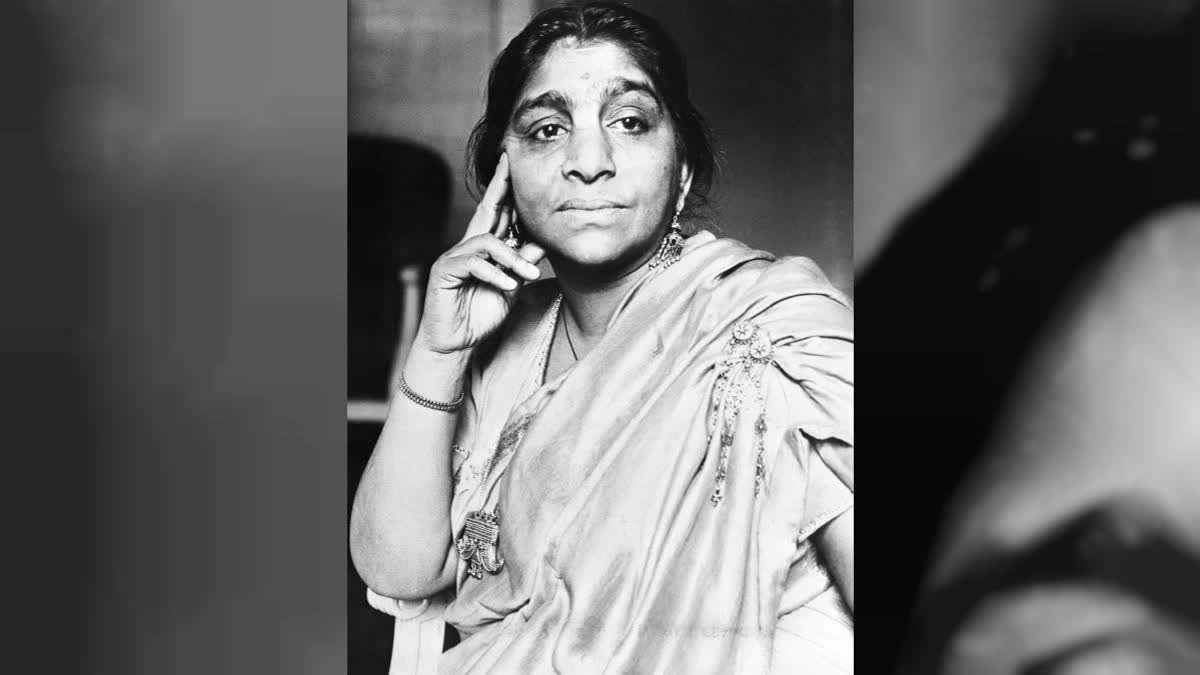Hyderabad: National Women’s Day, observed annually on February 13 stands as a vibrant tribute to the multifaceted accomplishments of women across cultural, social, political and economic spheres. The celebration finds its roots in the birthday of Sarojini Naidu, a luminary figure in Indian history. Widely recognised as the 'Nightingale of India', Sarojini Naidu's indelible mark on the nation is commemorated on this day, reflecting upon her remarkable journey as a poet, freedom fighter and the first female president of the Indian National Congress.
Sarojini Naidu's early life: Born on February 13, 1879, in Hyderabad to Aghorenath Chattopadhyay, a Bengali Brahmin and the principal of the Nizam’s College, Sarojini Naidu's early life reflected the convergence of academic brilliance and cultural richness. A prodigious scholar, she entered the University of Madras at the tender age of 12, embarking on a journey that would later take her to King’s College, London, and Girton College, Cambridge, where she continued to hone her intellect and broaden her horizons.
Role in India's freedom struggle: Sarojini Naidu's narrative intertwines with India's struggle for independence. After her time in England where she engaged in suffragist activities, she was drawn to the Indian National Congress movement for India’s freedom from British rule. Her role in pivotal moments, such as the Salt Satyagraha movement led by Mahatma Gandhi, showcased her commitment to the cause. Naidu's fervent participation in the Quit India Movement further solidified her position as a staunch advocate for India's liberation.
Her activism came at a cost, as she faced repeated arrests by British authorities. Her resilience during more than 21 months of incarceration illustrated her unwavering dedication to the cause of independence. In 1925, she assumed the presidency of the Indian National Congress, becoming the first woman to hold this esteemed position.
Political achievements: Beyond her activism, Sarojini Naidu broke barriers in the political arena. She ascended to become the first woman Governor of the United Provinces, now known as Uttar Pradesh. Her journey from a young scholar to a prominent political figure underscored her versatility and trailblasing spirit. Additionally, her contributions to the drafting of the Indian Constitution showcased her commitment to shaping the future of the nation.
Poetry and oratory: While her political achievements are noteworthy, Sarojini Naidu's poetic prowess is equally iconic. Her poetry, often characterised by its rich imagery and lyrical quality, covered a spectrum of themes, including romance, patriotism and tragedy. Her famous work, 'In the Bazaars of Hyderabad,' published in 1912, remains a testament to her literary brilliance.
Naidu's poetry and oratory skills were not confined to artistic expression alone. She effectively utilised these tools to champion women’s rights alongside her nationalist endeavours. Encouraged by Gopal Krishna Gokhale, a key leader in the nationalist movement, Naidu entered the realm of politics in 1902. Her advocacy for the education of Indian women in a speech to the Social Council of Calcutta in 1906 marked a significant early contribution to the cause.
Legacy and contributions: Beyond her roles as an activist, politician and poet, Sarojini Naidu emerged as an iconic figure for millions of women across the country. Her bold convictions and strong personality made her a hero, symbolising resilience and determination. Her demise on March 2, 1949, marked the end of a remarkable life, leaving behind a legacy that continues to inspire generations.
Famous books by Sarojini Naidu: Sarojini Naidu's literary legacy is reflected in works such as 'The Golden Threshold' (1905), 'The Bird of Time' (1912), 'The Sceptred Flute' (1928) and more. Her writings, spanning children’s poems to reflections on patriotism and love, remain timeless expressions of her creativity.
Inspiring quotes by Sarojini Naidu:
To quench my longing I bent me low/By the streams of the spirits of Peace that flow/ In that magical wood in the land of sleep.
We want deeper sincerity of motive, a greater courage in speech and earnestness in action.
A country’s greatness lies in its undying ideals of love and sacrifice that inspire the mothers of the race.
In consecrated calm, forgotten yet. Of the keen heart that hastens to forget old longings in fulfilling new desires.
Hark to a voice that is calling, to my heart in the voice of the mind.



